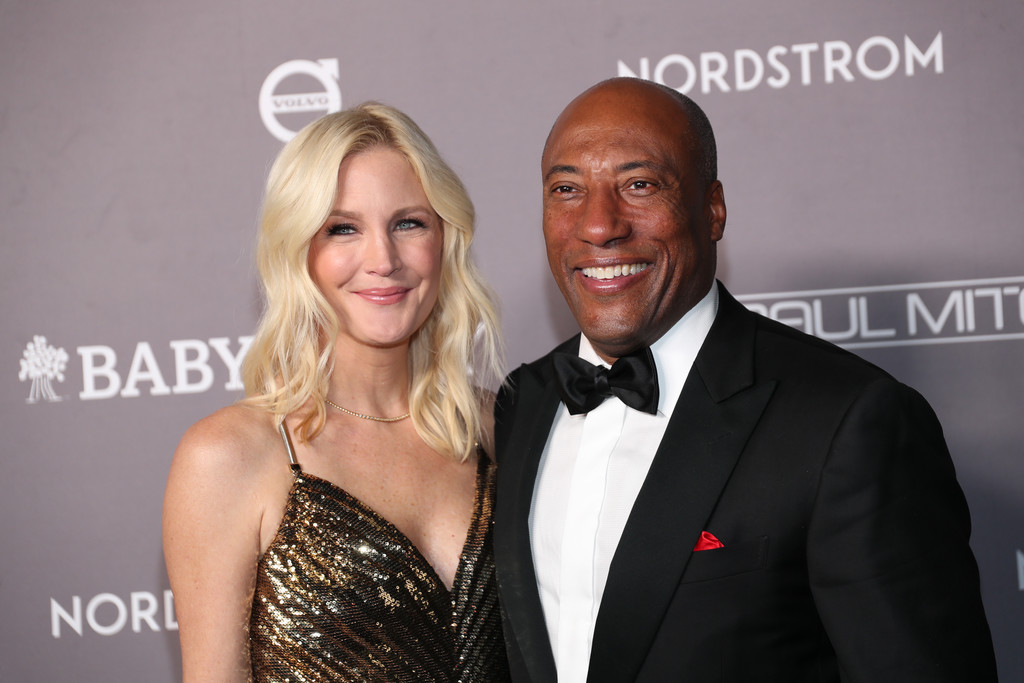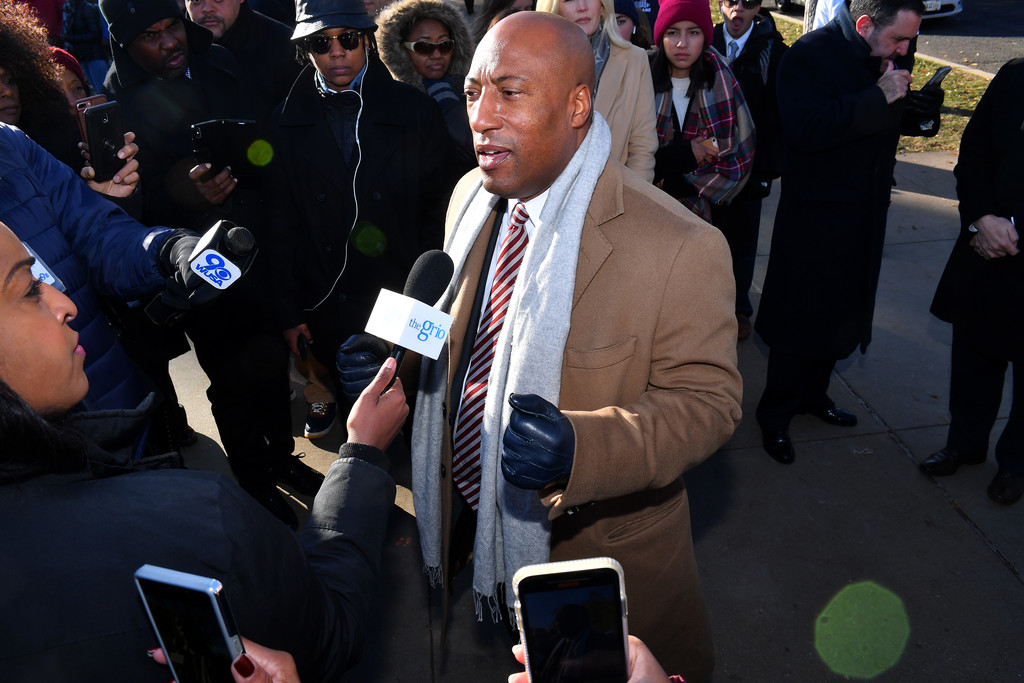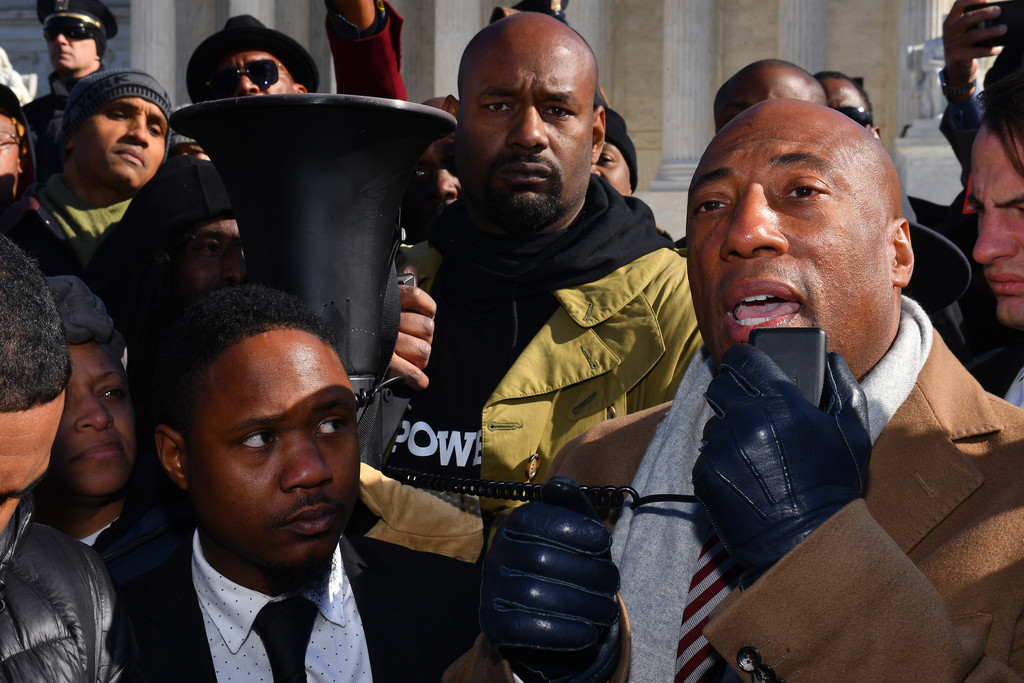*Byron Allen gave an overview of the content that his Allen Media Group Entertainment Studios is serving up during a presentation at the Television Critics Association panel on Feb 16.
The company’s expanding portfolio includes The Weather Channel, Cars.TV, Comedy.TV and genres related to entertainment to travel and pets.
We previously reported, in August, Allen Media Broadcasting, a division of Allen Media Group, acquired Honolulu ABC affiliate KITV from SJL Broadcasting for $30 million. The mogul reportedly plans to spend another $10 billion over the next two years to buy more network affiliates, per Yahoo.
EURweb.com correspondent Ny MaGee spoke with Allen at TCA about his legacy, cultural impact– and how he has been impacted by the protests and the civil unrest that gripped the nation this past summer following the police killing of George Floyd in Minneapolis.
When asked if any of this has inspired the type of content and programming he wants to put out going forward, Allen noted that he has “been ahead of this and we’ve been leading the pack, if you really take a good look at who I am and the events that have occurred in my career in my life.”
Allen’s Entertainment Studios recently reached a settlement in his $10 billion racial-discrimination lawsuit against Charter Communications.
Allen reached a deal last year to end his lawsuit against Comcast Communications, NBC News reported. He sued the company for $20 billion in 2015 for refusing to carry his lifestyle channels, arguing that it was because of his race. He brought a similar lawsuit against cable provider Charter for $10 billion for refusing to carry his networks.
Allen’s attorneys linked a section of the Civil Rights Act of 1866 to the case, which says all people should have “the same right” to contracts as whites. To that point, Allen noted during our conversation at TCA: “By way of example, it’s well-known that I’ve filed some high profile lawsuits to make sure that there was more economic inclusion for Black-owned media that went all the way to the Supreme Court. So that’s something that is very much a part of my legacy,” he explained, “using the Civil Rights Act of 1866, Section 1981, which was put on the books to protect the newly freed slaves and to make sure that the newly freed slaves, and, in particular, African Americans, could participate in the economic inclusion of America. And that was something that wasn’t really happening.”
Allen continued, “When you look at the fact that historians believe that the reason why the newly freed slaves never got 40 acres and a mule is because they got this law and this law wasn’t really being utilized and being upheld. So this is a journey that I took many, many years ago.”
Allen went on to explain that the journey “started for me as a young child when I was in Detroit in 1968,” a pivotal moment for young Allen as it is when he came to fully understand race relations in America.
“I was in the middle of the street playing urban baseball using my neighbor’s cars as first and second base. And my mother and my grandmother started crying like I’ve never seen and with unbelievable pain, saying, “They killed him. They killed him.” And I said, “They killed who?” And they said, “Martin Luther King, Jr.” And next thing I know, literally, seconds later I turned and I looked down the street and I was looking down the barrel of a tank and troops were coming towards me with riffles and bayonets, and dogs. And my mother and my grandmother started screaming, ‘Get in the house before they kill you,’” he recalled.
Continuing, “And when I got in the house and they were crying I asked them what was going on and they said, “They killed Martin Luther King.” And I said, “Why?” And they said, “They hate us.” And “they hate us,” referring to America hates Black people. “And they don’t want us to have anything.” And that was very painful for me as a child. And I remember at that moment, at seven years old, losing my innocence, losing my childhood,” Allen shared.

“I felt like a child of war and I felt like, “Why would someone hate me simply because of the color of my skin?” And this something that was profound for me and I made it a point to seek out more information. And I became very close with Coretta Scott King and Martin Luther King’s widow. And I bought the rights to her story because I wanted to look at Martin through her eyes. And she taught me and she said, “Byron, as Black people we’ve had four major challenges: Number one, end slavery, number two, end Jim Crow…” which I think was more damaging than slavery because when we were slaves we were considered assets, but the moment we became free we went from being assets to liabilities because we were competing for the great American economic pie. And she said, “Number three, “Achieve civil rights.” which she and Martin did such a phenomenal job of doing that.
“And then she choked up and she said, “And, number four, the real reason they killed my Martin, achieve economic inclusion.” She said, “Byron,…” she said, “…they didn’t kill Martin because of the speech ‘I have a dream,’ they killed him because of the speech ‘The other America.’ And in that speech he said there are two Americas, one America has access to opportunity, capital that’s not predatory, and education, clean water and food in abundance. And he said two Americas will not survive. We need to have one America.”
“And the great prophet, Martin Luther King, Jr. said this to us over half a century ago and now you’re seeing this manifest itself, where you have, now, two Americas and we’re falling apart. And he warned us that we need to achieve this. So I’ve been there.”
We Publish News 24/7. Don’t Miss A Story. Click HERE to SUBSCRIBE to Our Newsletter Now!







